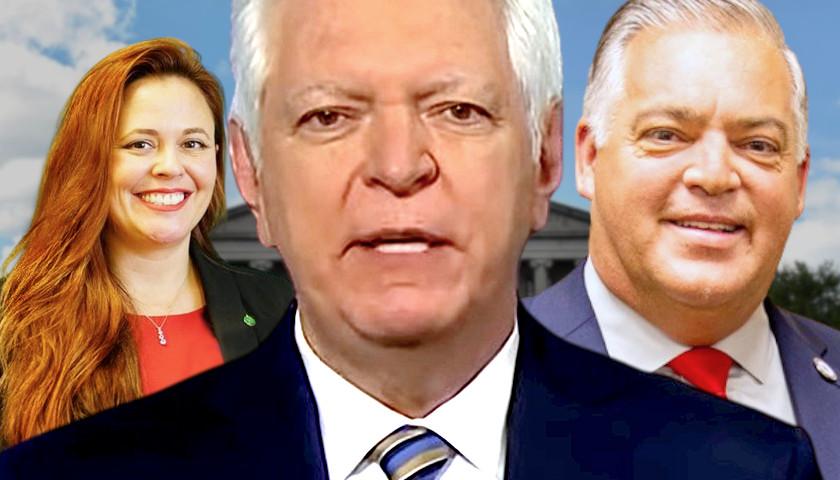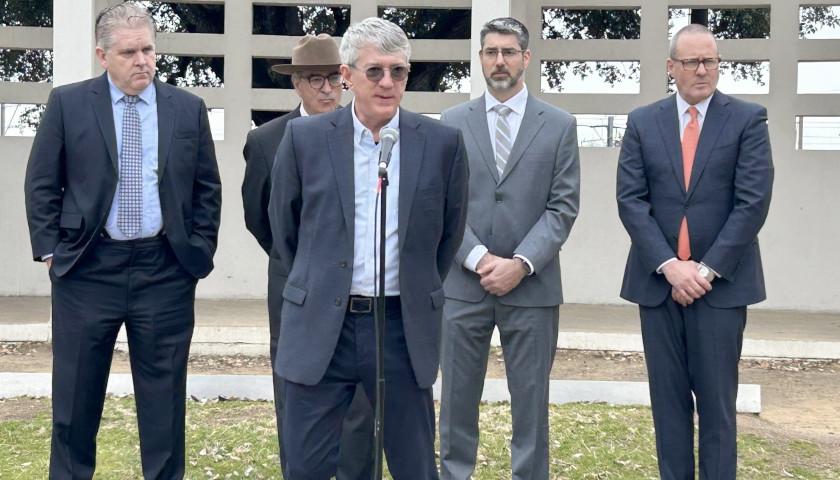Live from Music Row, Monday morning on The Tennessee Star Report with Michael Patrick Leahy – broadcast on Nashville’s Talk Radio 98.3 and 1510 WLAC weekdays from 5:00 a.m. to 8:00 a.m. – host Leahy welcomed Vinnie Vernuccio of the Institute for American Workers to the newsmaker line to discuss the bill regarding teacher payroll deductions deferring union dues on its way to Governor Bill Lee’s desk.
Leahy: We turn our attention now on our newsmaker line to our very good friend Vinnie Vernuccio of the Institute for American Workers. Good morning Vinny.
Vernuccio: Hey, good morning! Thanks again for having me on.
Leahy: Happy to have you on Vinnie. There’s a bill that was passed here in the Tennessee General Assembly that’s on its way to Governor Lee for signature. And that bill allows teachers not to have to do the payroll deduction deferred union dues. Do I have that right?
Vernuccio: That’s right. So the Workers for Opportunity Project at the Mackinac Center have been working on two bills really hard down there. One of which was attached to the teacher pay raise, ensuring that teachers get their full paychecks. And that is going to the governor’s desk right now for his signature. And a big part of that is saying that the schools should not be the bill collector for union dues.
Leahy: Yes, that’s a good idea. Do we think the governor’s gonna sign that bill?
Vernuccio: The governor was a big proponent of the bill, making sure that teachers are rewarded by giving them one of the biggest pay raises in state history. And he was also a big proponent of making sure that they receive every cent of their paycheck and that they have the ability to say, yes, I want to pay the union, or no, I don’t. I think we can say pretty confidently that he will sign.
Leahy: Good. Good. Is there other legislation the Mackinac Center’s been involved in here in Tennessee?
Vernuccio: The Worker’s Opportunity Project of the Mackinac Center, they were reached out to by lawmakers saying, hey, there are issues down here and we need help.
And that is part of the reason why we’ve been so actively backing both the paycheck protection legislation for teachers that we just spoke about. And also a bill that would protect the secret ballot in unionization elections in companies that are getting state incentive dollars.
Leahy: Where does that legislation stand, Vinnie?
Vernuccio: Both of them have passed. Both of them are going to the governor’s desk. It was a very good week last week for both public sector and private sector workers down in Tennessee.
Leahy: Vinne, by the way, let me just say the very best name that I can ever think of for an Italian American. Vinnie Vernuccio. What a great name. Don’t you love being Vinnie Vernuccio?
Vernuccio: I really appreciate it. I do. I do labor policy. And by the way, I guess not a good thing. I am an attorney, but I’m also from New York.
Leahy: By the way, just as an aside I saw a New York-based movie over the weekend Somewhere in Queens. It’s a Ray Romano thing I’ve recommended. It’s not a really big movie but if you’re from there. Are you from New York City?
Vernuccio: New York City.
Leahy: Where in New York City are you from?
Vernuccio: The Upper West side of Manhattan.
Leahy: Oh, okay. Not from Queens. But I recommend the movie.
Carmichael: Vinnie, if the state legislature in Tennessee, or I guess in any other state decided that it wanted, it, wanted to pass legislation that said, there will be no government employee, state government, employee unions or local government employee unions in the state, does the state legislature have that authority over state and local government employee unions?
Vernuccio: When it comes to public sector bargaining, so you’re talking about state employees local employees you name it. What the state can do is, yes, they have full authority to say we will not bargain with you. And that’s actually something that Arkansas passed last year.
And Arkansas also just passed a version of paycheck protection that is similar to the bill that’s going to the governor’s desk. But that’s been passed in a number of states. Now, that doesn’t affect the ability to have those government unions or for public employees to get together and have professional associations or unions. But those bills simply say the state will not or as it happens, rather in Tennessee collaboratively conference with those unions. And that is in the power of a state legislature.
Carmichael: So a state could if it chose to say that no government employee union in the state, whether it’s a state or local government employee union shall have bargaining power.
Vernuccio: It also can say that no state payroll nor local payroll will take directly from the check and give it to the unions and therefore it has to be a purely voluntary association and payment. A state legislature does have that authority.
Vernuccio: State legislature does have that authority. And that is the heart of what’s in that paycheck protection provision within the bill that is going to the governor’s desk right now. It’s one of the biggest pay raises in state history is saying that, yes, we are not going to be the fundraiser for union politics.
We are not going to be the bill collector for union dues. So that’s in there. Tennessee also has what’s his collaborative conferencing. So it’s not the same thing. It’s not as stringent as collective bargaining. But yes, the state legislature could go even further within that if they chose to.
Leahy: In Arkansas, they passed this bill that prohibits collective bargaining by state public sector employees. It is the law in Arkansas today. Is that right?
Vernuccio: Yes. They passed in, I believe two years ago. Other states such as North Carolina, Indiana, and several other states have similar laws. So yes, it is possible really when you’re talking about government unions and public employees. All of that falls squarely under a state’s authority. The private sector that’s mostly federal, except for right to work and some other provisions. But when you’re talking about government unions, yes, that’s all state.
Leahy: What has the impact of that law in Arkansas that prohibits collective bargaining by state public sector employees? What has the impact of that law been?
Vernuccio: Oh, it’s giving more power to the individual. public employee. And if you want to talk about another state where you know it, it has been the law of the land for a little bit longer in Wisconsin.
Wisconsin did not fully ban collective bargaining, but what they did for government unions is they limited it to bargaining over wages only, and they caveated that. It will be wages only, but subject to inflation. If they want to go over inflation, then it should be by a vote of the people.
And that has seen massive returns for both public employees and teachers that are now getting merit paid, getting rewarded for how hard they work, not by logging in over the year on the job for tax pay taxpayers. You saw school districts and counties actually start to pass cuts because those school districts weren’t subject to collective bargaining agreements.
And if we have time, I would love to get into some of those details. But yes, if you want to see really good examples, look to states like Wisconsin that had very strong government collective bargaining, then passed pro-worker and pro-taxpayer reforms. It really resulted nicely.
Listen to today’s show highlights, including this interview:
– – –
Tune in weekdays from 5:00 – 8:00 a.m. to The Tennessee Star Report with Michael Patrick Leahy on Talk Radio 98.3 FM WLAC 1510. Listen online at iHeart Radio.
Photo “Vinnie Vernuccio” by Institute for the American Worker. Background Photo “Classroom” by Wokandapix.




